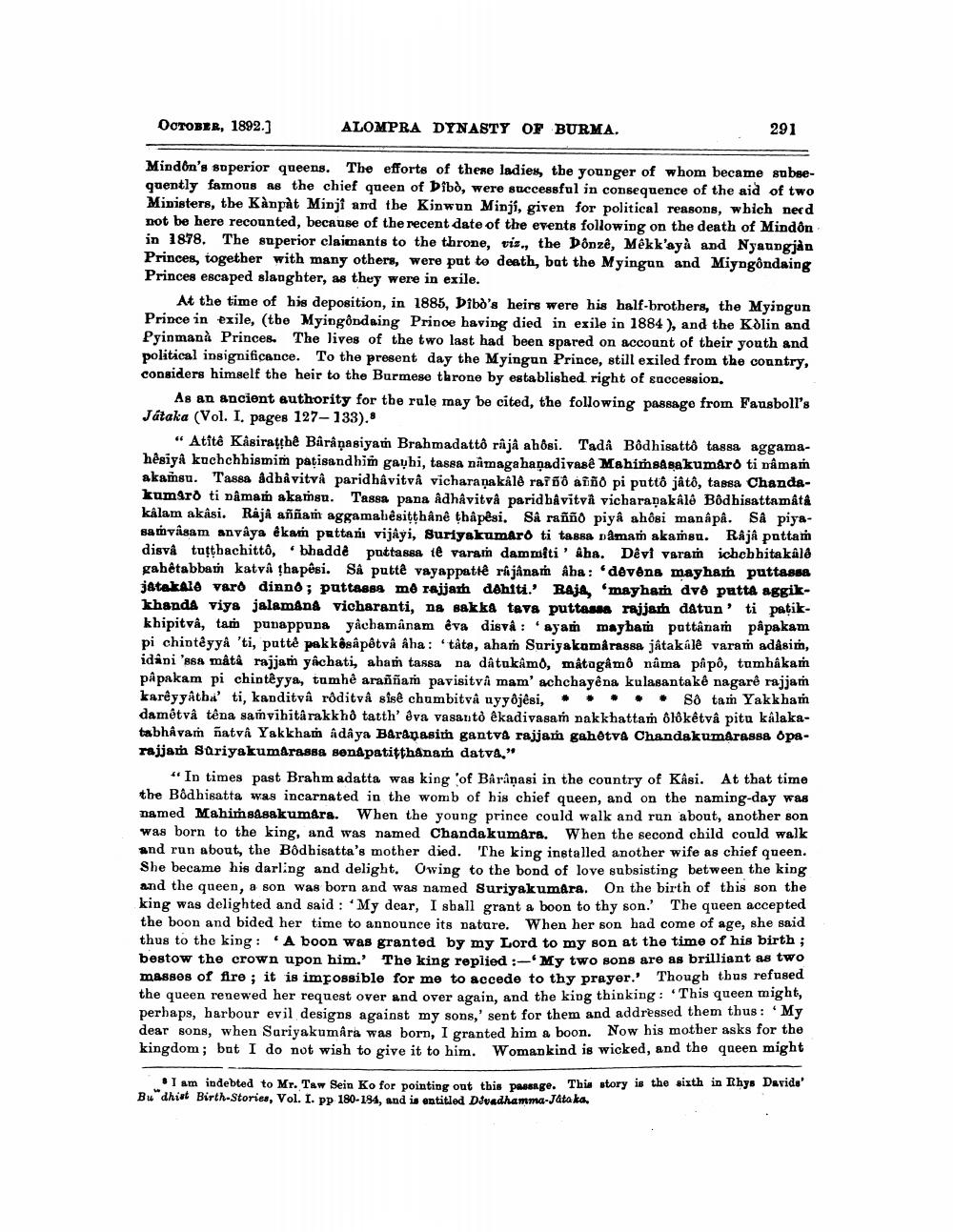________________
OCTOBER, 1892.]
ALOMPRA DYNASTY OF BURMA.
291
Mindon's superior queens. The efforts of these ladies, the younger of whom became subsequently famous as the chief queen of Dibò, were successful in consequence of the aid of two Ministers, the Kanpàt Minji and the Kinwun Minji, given for political reasons, which need not be here recounted, because of the recent date of the events following on the death of Mindôn in 1878. The superior claimants to the throne, viz., the Dônze, Mekk'ayà and Nyaungjan Princes, together with many others, were put to death, bat the Myingun and Miyngôndaing Princes escaped slaughter, as they were in exile.
At the time of his deposition, in 1885, Dibo's heirs were his half-brothers, the Myingun Prince in exile, (tbe Myingôndaing Prince having died in exile in 1884), and the Kolin and Pyinmanà Princes. The lives of the two last had been spared on account of their youth and political insignificance. To the present day the Myingun Prince, still exiled from the country, considers himself the heir to the Burmese throne by established right of succession.
As an ancient authority for the rule may be cited, the following passage from Fausboll's Jataka (Vol. I. pages 127-133).
" Atstê Käsiratche Bârâ nasiyat Brahmadatto râjâ ahosi. Tada Bodhisattô tassa aggamahêsiya kuchchhismim patisandhim gaụhi, tassa namagahaņadivasê Mahimsasakumaro ti naman akamsu. Tassa adbåvitvå paridbâvitvî vicharaņakalê raiño aiño pi puttó jâtô, tassa Chandakumarð ti dâmam akamsu. Tassa pana Adhåvitvå parid bAvitvå vicharanakáló Bodhisattamata kalam akasi. Rajâ añña aggamabêsitthânê thâpësi. Sa raññó piya ahôi manapå. SA piyasamvasam anyâya eka puttan vijayi, Suriyakumaro ti tassa pamam akańsu. Râjâ pattam disva tutthachitto, bhadde pattassa tê varam dammsti' Aha. Dêvi varam ichchhitakâlê gabêtabban katvà tha pêsi. Så putte vayappatte rajânam Aha: 'devens mayham puttassa jatekalo varo dinno; puttases mê rajjam dahiti.' RAJA, 'mayham dve patta aggikkhanda viys jalamana vicharanti, na sakka tava puttassa rajjar dAtun' ti patik. khipitvå, tam punappuna yâchamânam eva disva : ayam maybam pattanam påpakam pi chintêyyå 'ti, putte pakkôsâpôtva Aha: tâta, ahań Suriyakamârassa játakale varam adasin, idani '8s8 mâtê rajjam yachati, aba tassa na datukảmo, mậtagâmô nama pâpô, tumhakam papakam pi chintêyya, tumhê araññam pavisitvå mam' achchayềna kulasantakê nagarê rajjam karêyyatha' ti, kanditvå rồditvå sisê chumbitvå uyyôjési, . . . . . So tam Yakkham damêtvå têna sasvihitä rakkhð tatth' dva vasantò êkadivasaí pakkhattam 018kêtva pitu kalakatabhávam ñatva Yakkham Adâya Baranasim gantvå rajjam gahetva Chandakumarassa Oparajjan Sariyakumarassa senapatitthanan datva."
“In times past Brahm adatta was king of Bariñasi in the country of Kasi. At that time the Bodhisatta was incarnated in the womb of his chief queen, and on the naming-day was named Mahimsasakumara. When the young prince could walk and run about, another son was born to the king, and was named Chandakumara. When the second child could walk and run about, the Bodhisatta's mother died. The king installed another wife as chief queen. She became his darling and delight. Owing to the bond of love subsisting between the king and the queen, a son was born and was named Suriyakumara. On the birth of this son the king was delighted and said: 'My dear, I shall grant a boon to thy son. The queen accepted the boon and bided her time to announce its nature. When her son had come of age, she said thus to the king: 'A boon was granted by my Lord to my son at the time of his birth; bestow the crown upon him.' The king replied :-My two sons are as brilliant as two massos of fire ; it is impossible for me to accede to thy prayer.' Though thus refused the queen renewed her request over and over again, and the king thinking. This queen migas, perhaps, harbour evil designs against my sons.' sent for them and addressed them thus: My dear sons, when Suriyakumara was born, I granted him a boon. Now his mother asks for the kingdom; but I do not wish to give it to him. Womankind is wicked, and the queen might
I am indebted to Mr. Taw Sein Ko for pointing out this page. This story is the sixth in Rhy Davids' Budhist Birth-Stories, Vol. I. pp 180-184, and is entitled Djuadhamma Jataka.




